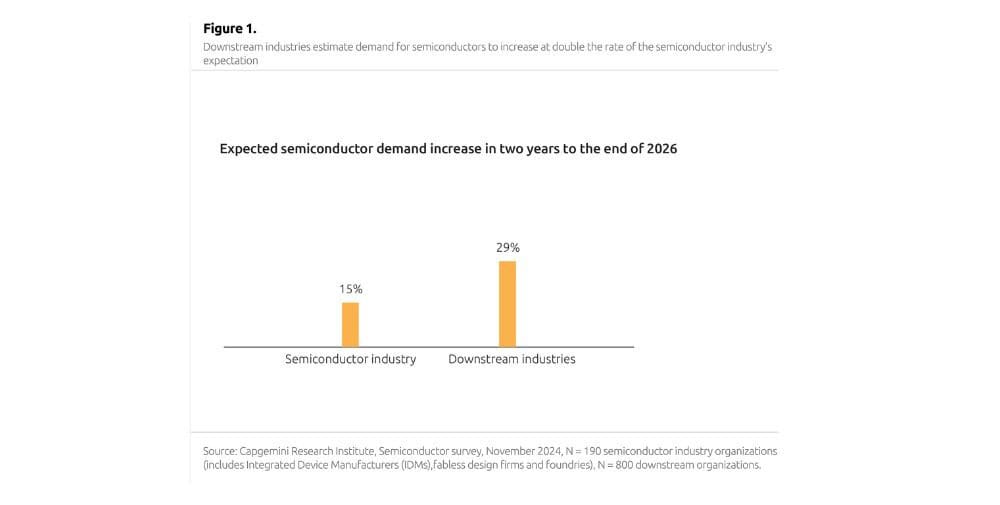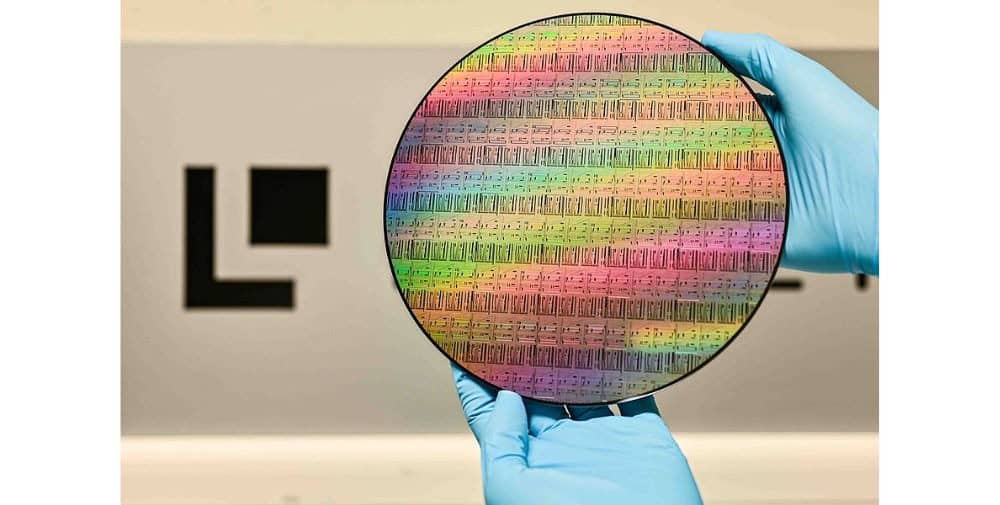
Demand for AI chips, customized integrated circuits and memory-intensive components will increase significantly over the next twelve months. To fully exploit the potential of this trend, the semiconductor industry should make targeted investments in innovative design approaches, cutting-edge and sustainable manufacturing technologies as well as increased local sourcing and nearshoring to ensure long-term supply chain stability.
The introduction of Gen AI and technologies such as 5G, IoT, autonomous driving, AR/VR and edge computing are driving demand for more powerful, efficient and customized chips: almost three in five semiconductor companies say that Gen AI and wireless technologies such as 5G are shaping their strategic direction.
Advances in semiconductor technology are driving innovation in downstream industries and enabling smarter and more efficient products. Due to the enormous strategic importance of semiconductors, less than three in ten companies believe that the chip supply is sufficient.
“The semiconductor industry is facing major challenges: Customers are demanding personalized and intelligent products. AI will become a component in almost all devices. This requires powerful, efficient and customized chips across the board. At the same time, the semiconductor industry is under high pressure to innovate and reduce costs,” says Peter Fintl, Vice President Technology & Innovation at Capgemini Engineering in Germany. “The industry must seize this moment and become faster and more efficient in a ‘chip-to-industry’ approach that supports a complete, software-oriented range of services. Investment in cutting-edge design processes and manufacturing methods based on AI and Gen AI will be crucial to meet the specific requirements. At the same time, it is essential to make manufacturing processes even more sustainable.”
Gen AI drives demand for customized chips
According to the study, 39 percent of semiconductor companies expect Gen AI to drive demand for customized chips over the next two years. Most downstream companies (81 percent) expect their demand to increase by 21 percent in the next twelve months alone.
Many industry and tech players have put customized semiconductor solutions on their development agenda. This minimizes dependence on external suppliers and ensures control over their intellectual property, while increasing tangible competitive advantages in terms of unique functionality, development speed, efficiency and compatibility with in-house hardware and software.
Specifically power-intensive AI applications require novel chip technologies to combine performance, efficiency and cost. Innovative chip architectures, EUV (extreme ultraviolet) lithography, 3D packaging and the use of chiplets[2] are the means of choice. According to the study, the industry expects its R&E budgets to increase by around 10 percent over the next two years. Almost half of manufacturers also state that they want to optimize processes using AI and machine learning (ML).
The increasing use of AI and Gen AI is leading to an increased demand for specialized neural processing units (NPUs) and high-performance graphics processing units (GPUs) that can handle the necessary computing power and process large data sets efficiently. More than half of downstream industries (54 percent) believe that advances in GPU computation and AI/ML acceleration can provide the greatest benefit.
Companies prioritize sustainability, supply chain resilience and security
According to the study, more than half of downstream companies plan to prioritize chip sustainability, supply chain resilience and cybersecurity capabilities in the next two years.
Only two in five semiconductor companies are confident in the resilience of their supply chains. The semiconductor industry expects to increase its domestic sourcing from the current 40 percent to 47 percent over the next two years to mitigate the risks associated with international logistics. To increase stability, the industry also anticipates a 4% increase in nearshoring. 74 percent of semiconductor companies expect to increase their investments in the US, while 59 percent plan to increase their investments in Europe.
The security of chips remains a critical area in a complex supply chain. Almost three out of five semiconductor development companies emphasize that they are focusing on cryptographic protection of devices.
Finally, almost 60 percent of downstream companies state that the sustainability of chips will play a crucial role in component selection. The industry is therefore focusing on core green initiatives: saving energy, implementing water recycling and reuse systems, using greener chemicals and minimizing waste.
Methodology
For the study, Capgemini Research Institute surveyed 250 director-level or higher executives from the semiconductor industry [including integrated device manufacturers, fabless design companies, foundries, outsourced semiconductor assembly and test (OSAT) companies, electronic design automation (EDA) companies, capital equipment companies, and material and subsystem companies] in eleven countries in Asia Pacific, Europe and North America. These companies each have an annual turnover of 500 million US dollars or more. In addition, the Institute surveyed 800 executives at the director level or above from 10 downstream industries in 12 countries in Asia-Pacific, Europe and North America operating in automotive, consumer electronics, retail, telecommunications, aerospace and defense, high-tech software, Internet, enterprise data centers, networking, medical devices/medical electronics, industrial equipment, financial services and energy. These companies each have an annual turnover of one billion US dollars or more. In addition to the survey results, in-depth interviews were conducted with twelve executives from the semiconductor and downstream industries. The global surveys took place in November 2024.
About Capgemini
Capgemini is a global business and technology transformation partner for organizations. The company supports them in their dual transformation for a more digital and sustainable world – always focused on tangible progress for society. Capgemini is a responsible, diverse group of companies with over 55 years of history and 340,000 employees in more than 50 countries. Clients rely on Capgemini to unlock the potential of technology for the full breadth of their business needs. Capgemini uses its strong strategy, design and engineering expertise to develop comprehensive services and end-to-end solutions. The company leverages its leading AI, cloud and data capabilities, deep industry expertise and partner ecosystem. The Group generated revenue of 22.5 billion euros in 2023.
Get the future you want | www.capgemini.com/de
About the Capgemini Research Institute
The Capgemini Research Institute is Capgemini’s in-house think tank on digital matters. The Institute publishes research on the impact of digital technologies on large organizations. The team draws on Capgemini’s global network of experts and works closely with academic and technology partners. The institute has research centers in India, Singapore, the UK, and the US.
Visit us at https://www.capgemini.com/de-de/insights/capgemini-research-institute/
Subscribe to our studies at www.capgemini.com/capgemini-research-institute-subscription
[1] Downstream organizations are those organizations that depend on semiconductor supply. While nearly all industries rely on semiconductors to some degree for their products or services and operations, the scope of this study is automotive, consumer electronics, retail, telecommunications, aerospace and defense, high-tech software, Internet, enterprise data centers, networking, medical devices/medical electronics, industrial equipment, financial services, and energy.
[2] Chiplets: Independent chip units that are combined to form a complex overall system (system-on-a-chip).
– – – – – –
Further links
👉 www.capgemini.com
👉 To the complete study
Photo: Capgemini




